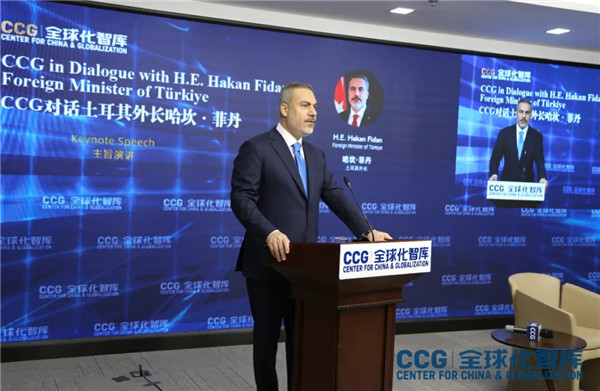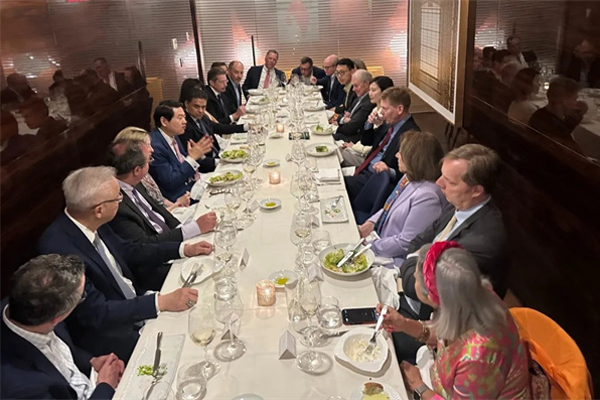CCG expert delegation visit US think tanks to boost bilateral understanding
At the beginning of May, the Center for China and Globalization expert delegation, whilst in the US conducting “track II diplomacy” activities, visited several think tanks and research institutions to promote greater bilateral understanding. These included the Center for Strategic and International Studies (CSIS), Hudson Institute, Heritage Foundation, Wilson Center Kissinger Institute, American Enterprise Institute (AEI), Carnegie Endowment for International Peace, Cato Institute and Pew Research Centre, among others. During these exchanges CCG representatives held dialogues with their US counterparts on topics such as Sino-US relations and trade tensions, global governance, multilateral trade mechanisms and future cooperation between Chinese and American think tanks and research organizations.
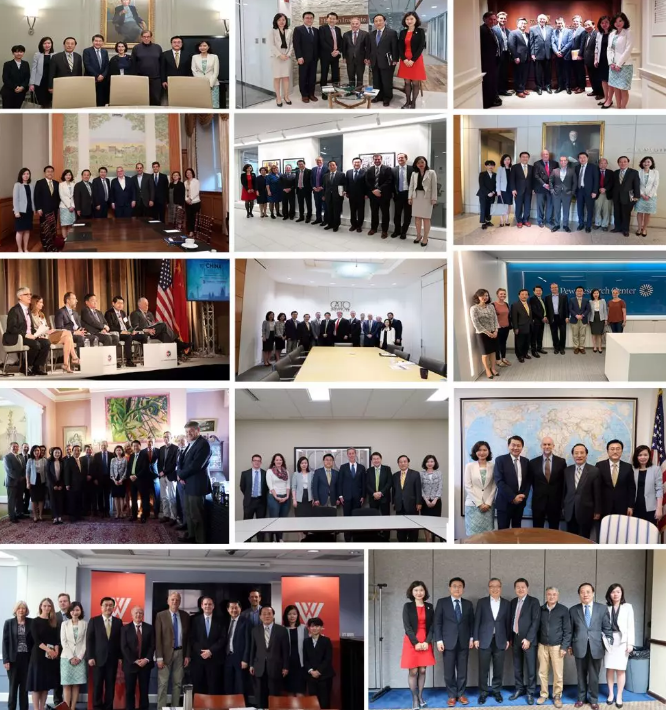
Think tanks have become an essential part of the policy-making process and the promotion of social-development, with an increasingly important role to play in fostering mutual understanding between nations, regions and across fields. This most recent CCG US trip expanded comprehension and trust between China and US through the exchange of research results and views between think tanks and research institutions.
1.CCG delegation revisit the Center for Strategic and International Studies
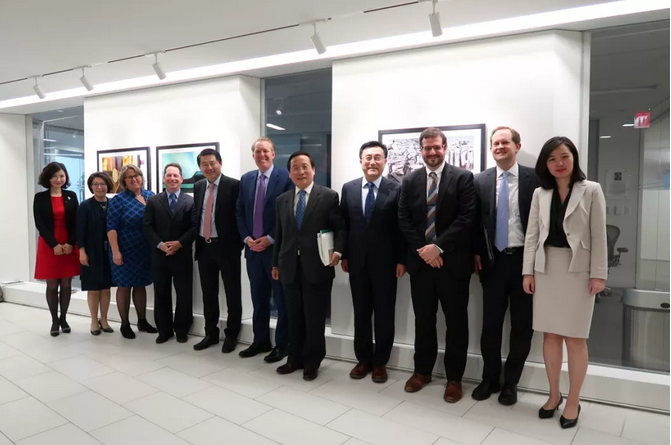
On May 1st, the CCG expert delegation visited the Center for Strategic and International Studies (CSIS), the well-renowned US think tank. CCG representatives held in-depth discussions with a number of CSIS senior researchers and US Department of Energy officials on a wide variety of issues. Topics covered include the future and challenges of Sino-US relations, Sino-US energy cooperation, multilateral trade mechanisms, and future academic cooperation. The attendees of this meeting included Samuel Brannen, Director of the Risk and Foresight Group and Senior Fellow of International Security Program; Patrick Buchan, Director of the U.S. Alliances Project and Fellow of Indo-Pacific Security; Maria DiGiulian, Senior Adviser on US Policy, US Department of Energy; Christopher K. Johnson, Senior Adviser to the Freeman Chair in China Studies; Jane Nakan, Senior Fellow of the Energy and National Security Program; Nikos Tsafos, Senior Fellow of the Energy and National Security Program and; Scott Kennedy, Senior Adviser to the Freeman Chair in China Studies and Director of the Project on Chinese Business and Political Economy, who chaired the meeting.
CSIS is a world-renowned think tank with significant influence in the Republican sphere. Founded in 1962, CSIS mainly engages in the evaluation of US policy risks, analysis of regional affairs such as the EU and ASEAN, research on international security and stability, and the establishment of long-term national strategies. Over the past 40 years, CSIS has been home to a large number of leading international relations academics and political figures, and established its leading position among US and global strategic and policy research institutions.
CCG and CSIS have maintained communication and engaged in cooperation over the past few years. In 2016, on the 15th anniversary of China’s accession to the WTO, CCG and CSIS jointly held the “WTO and Global Governance Development Trends Seminar” to discuss issues related to the multilateral trading system and global governance. In May 2018, a CCG delegation invited CSIS to participate in two seminars on “China-US Global Economic Order Dialogue” and “Thirty Years of Sino-US Relations” in Washington D.C.. In September of the same year, CCG visited the US to carry out “track II diplomacy” engagement and research series activities, where CCG presented its report: China-US trade relations and challenges: past, present, future and policy options. On December 10th 2018, CCG and CSIS held a joint roundtable seminar at CCG’s Beijing Headquarters where Scott Kennedy, Senior Adviser to the Freeman Chair in China Studies and Director of the Project on Chinese Business and Political Economy, delivered a speech on Sino-US relations, the consensus reached between China and the United States at the G20 summit and the future trend of Sino-US trade negotiations.
2.CCG meetswith the President and top researchers at Hudson Institute
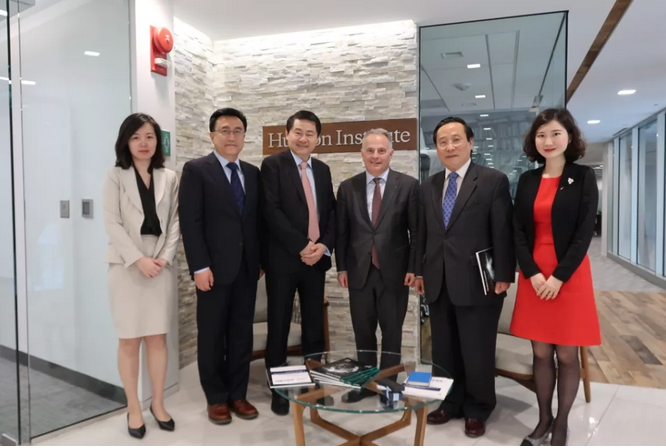
On May 1st, the CCG expert delegation visited the Hudson Institute at the invitation of the President and CEO of the Institute and member of the US Advisory Committee for Trade Policy and Negotiations, Kenneth Weinstein. Senior researchers at the institute also participated in talks with CCG, including Thomas J. Duesterberg, Senior Fellow, Eric Brown, Senior Fellow and Liselotte Odgaard, Visiting Senior Fellow. The exchange covered a variety of topics, taking focus on the prospects of a Sino-US trade deal and the impact of the trade tensions on future Sino-US relations, but also broader international issues such as WTO reform and multilateral trade mechanism.
The Hudson Institute is one of the three main conservative think tanks in the US and has significant influence with the current US administration as a favored think tank. Kenneth Weinstein, the President and CEO of the Hudson Institute, was named by President Trump to the Advisory Committee for Trade Policy and Negotiations. Michael Pillsbury, the Director of Chinese Strategy at the Hudson Institute and trusted advisor of former Defense Secretary Donald Rumsfeld, has been praised by President Trump as “the most authoritative expert on China”.
CCG and the Hudson Institute have maintained steady cooperation for a number of years. Most notably, the two think tanks hosted a joint symposium during CCG’s round of US “track II diplomacy” activities in September, 2018. This event saw CCG President Wang Huiyao and CCG Vice President Miao Lu introduce CCG’s China-US trade relations and challenges: past, present, future and policy options report and participate in a panel discussion with Hudson Institute fellows on Sino-US trade tensions.
3.CCG attends Heritage Foundation luncheon hosted by Amb. Terry Miller
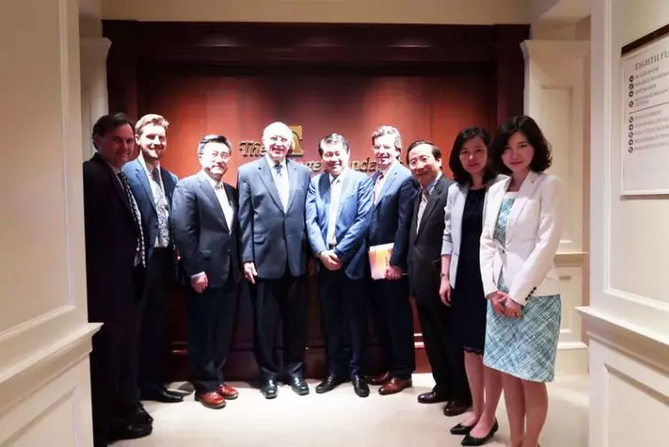
On May 2nd, the CCG expert delegation were invited to attend a luncheon at the Heritage Foundation hosted by Terry Miller, Director of the Heritage Foundation Center for International Trade and Economics and former US Ambassador to the UN. Jack Spencer, Vice President of the Institute for Economic Freedom, Walter Lohman, Director of the Asia Studies Center, Anthony Kim, Research Manager and Editor of the Index of Economic Freedom, Patrick Tyrrell, Research Coordinator and, Riley Walters, Policy Analyst, joined the CCG expert delegation for the luncheon. During the event, a dialogue was held on the potential outcome of the Sino-US trade deal and China’s new Foreign Investment Law, as well as other areas of China’s Reform and Opening Up. Talks were also held on the potential of expanding research and cooperation between CCG and the Heritage Foundation.
The Heritage Foundation is the main policy research institute of the New Right in the United States. It played an important role as a think tank in Donald Trump’s election campaign and has great influence on the current U.S. government’s positions on inward investment, foreign trade, immigration, national defense policy and other areas. In turn, the Foundation plays an important role as a think tank supporting the current US administration’s cabinet, domestic policy and foreign policy decisions. As Washington’s largest internationally-known think tank, the Heritage Foundation has a significant position in political, economic, academic and societal areas of the US.
4.Wilson Center Kissinger Institute welcomes CCG expert delegation
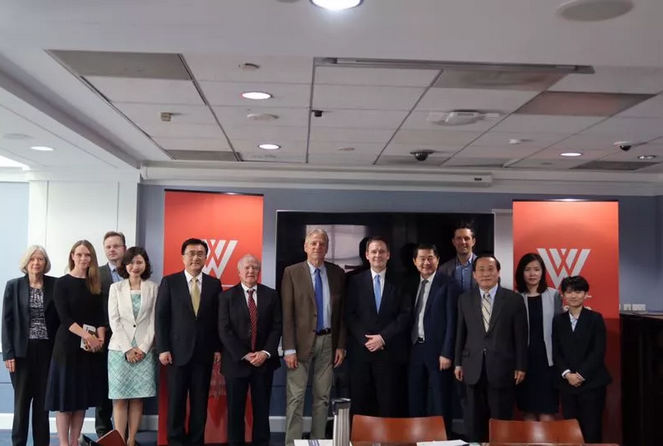
On May 2nd, the CCG expert delegation participated in a seminar dialogue at the Wilson Center Kissinger Institute in Washington, hosted by Robert Daly, Director of the Kissinger Institute on China and the United States. Meg Lundsager, Wilson Center Public Policy Fellow and former US Executive Director of the IMF, Kent Hughes, Wilson Center Public Policy Fellow, and Willson Center Fellows Katie Stallard-Blanchette, Benjamin Creutzfeldt, Felix Boecking and Michael C. Davis participated in the meeting. This seminar dialogue took focus on the development of Sino-US relations to the present trade tensions, as well as looking at the future of think tank collaboration and cooperation.
Founded as an official memorial to President Woodrow Wilson, the Wilson Center describes itself as “the nation’s key non-partisan policy forum for tackling global issues through independent research and open dialogue to inform actionable ideas for the policy community.” The Kissinger Institute for China and the United States was opened in 2008, named after veteran diplomat Dr. Henry Kissinger. The Kissinger Institute operates under its mission to ensure that informed engagement remains the cornerstone of US-China relations.
5.CCG attends think tank exchange with AEI experts
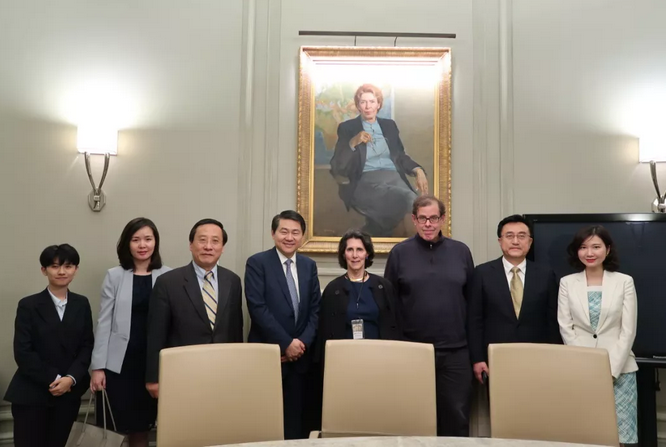
On the afternoon of May 2nd, the CCG expert delegation visited AEI, one the three largest and most influential conservative think tanks in the US. Nicholas Eberstadt, Henry Wendt Chair in Political Economy and Karlyn Bowman, AEI Senior Fellow, sat down with CCG experts to discuss a variety of issues, such as the factors behind the Trump Administration’s domestic and foreign policy. Looking forward, the two sides held in-depth discussions on the potential outcomes of a US-China trade deal and the prospects of US-China bilateral relations, as well as the 2020 US presidential election.
AEI is one of the most influential and important policy research organizations in the US. Kevin Hassett, who was nominated by Trump to become the 29th Chairman of the Council of Economic Advisers, is one of many leading AEI alumni, where he used to hold the State Farm James Q. Wilson Chair in American Politics and Culture and be the Director of Research for Domestic Policy. As Director of AEI’s Economic Policy Research, Kevin Hassett attended CCG’s Strategic Thinking High-Level Forum in Beijing, where he delivered a keynote speech. As Chairman of the White House Council of Economic Advisers, he played an important role in Trump’s tax reform and is considered by his colleagues in the Trump Administration as a contributor to the current economic growth in the US.
6.CCG visits Carnegie Endowment for International Peace to conduct academic exchanges on Sino-US relations and global governance
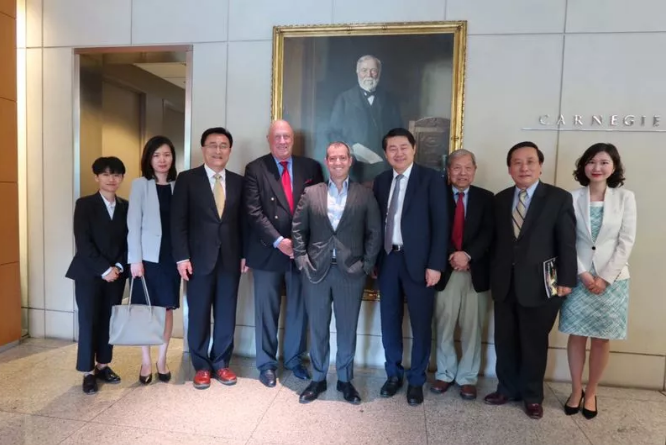
On May 2nd, the CCG expert delegation visited the prominent US think tank the Carnegie Endowment for International Peace’s (CIEP) Washington Headquarters. CIEP representatives Evan Feigenbaum, Vice President for Studies; Douglas Paal, Vice President for Studies and Director of the Asia Program; Yukon Huang, Senior Fellow in the Carnegie Asia Program, and several internationally renowned Sino-US relations experts, conducted a dialogue with the CCG expert delegation on Sino-US relations, the “Belt and Road” Initiative and the multilateral trade system.
CIEP was founded in 1910 by the Carnegie family and is one of the oldest and most prestigious think tanks in the United States. It boasts an international network of policy research centers around the globe which produce policy analysis at national, regional and international levels. The current CIEP president is former US Deputy Secretary of State William J. Burns, with famous scholars and figures such as Douglas H. Paal and George Perkovich both serving as vice presidents of the Institute. CIEP is a leading mainstream US think tank and has a strictly non-partisan and inclusive outlook, working towards promoting cooperation between countries and international exchanges in the United States. CIEP’s research focuses on international affairs and US foreign policy, especially immigration, nuclear non-proliferation, regional conflicts, pluralism, democratic construction and the use of force, and is committed to promoting cooperation between countries, and promoting the active participation of the international community.
7.CCG visits the Cato Institute to discuss global governance and reform
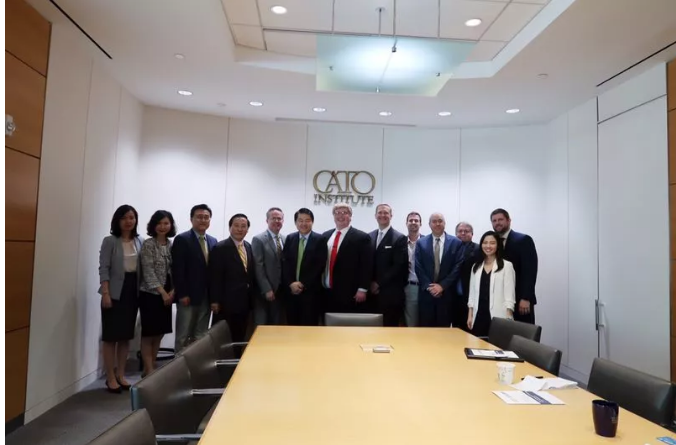
On May 3rd, the CCG expert delegation visited Cato Institute’s Washington D.C. Headquarters. CCG delegates held discussions with Daniel Ikenson, Director of Herbert Stiefel Trade Policy Studies; Colin Grabow, Trade Policy Analyst; Zhu Huan, Trade Policy Research Associate; John Glaser, Director of Foreign Policy Studies; Christopher A. Preble, Vice President for Defense and Foreign Policy Studies; Doug Bandow, Senior Fellow; Eric Gomez, Defense and Foreign Policy Analyst; Logan Kolas, Research Assistant and; Madison Parkhill, Research Assistant. The think tank exchange focused on issues of global importance such as global governance, WTO reform and global technology competition, as well as Sino-US relations and trade mechanisms.
Founded in 1977, the Cato Institute is deeply rooted in the classical liberal traditions of John Locke and Adam Smith, advocating a reduction in government intervention in domestic society and the economy, and reducing military and political interference at the international level. The Cato Institute is one of the most influential think tanks in the United States. It focuses on individual freedom, limited government, the free market and world peace, and conducts independent and non-partisan research on a wide range of policy issues.
CCG has established solid links with the Cato Institute. On April 14th this year, Daniel Ikenson, Director of the Cato Institute’s Trade Policy Center, attended the “5th China and Globalization Forum” organized by CCG, where he participated in a roundtable forum on the topic “Escaping Thucydides’ Trap – the future of Sino-US relations”.
8.CCG visits Pew Research Center to discuss future cooperation and development
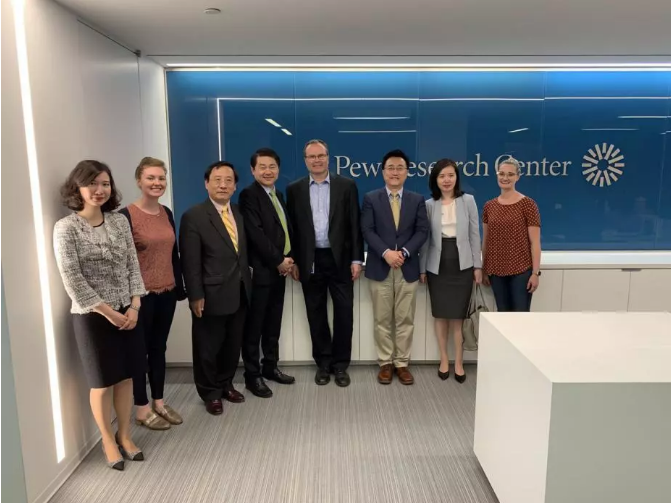
On May 3rd, the CCG expert delegation visited the world-renowned research and trend polling Pew Research Center in Washington D.C., where they held in-depth exchanges with Pew’s global strategy Vice President James Bell. Discussions centered on the future of development, analysis of Sino-US relations, and future cooperation between CCG and Pew.
The Pew Research Center is a world-renowned research and trend research company. Founded in 2004, Pew Research Center is a nonpartisan fact tank that informs the public about the issues, attitudes and trends shaping the world. It conducts public opinion polling, demographic research, content analysis and other data-driven social science research. It is an independent US polling agency with headquarters in Washington D.C.. As a neutral research and polling center, the Pew Research Center does not have a policy stance, it is a subsidiary of the Pew Charitable Trust. The research center’s research results and data are widely quoted by policy makers, journalists and academics and used to support various policy claims. The Pew Global Attitudes Poll Survey surveys the opinions of people around the world, ranging from the public’s assessment of their own living conditions to the public’s perception of the world’s current state and most important issues.
CCG maintains communication and cooperate with a number of top US think tanks that have influence in the Washington D.C. policy making community and the Trump administration. During CCG’s visit to the United States, CCG’s expert delegation conducted in-depth academic exchanges with leading think tanks and research centers to strengthen mutual understanding and communication, and also provide opportunities for further cooperation between China and the United States.
This series of CCG “track II diplomacy” activities provides strong support for policy research through in-depth academic discussions and exchanges of views with those in the US, as well as strengthening P2P exchanges, enhancing mutual trust, and promoting development. The members of the CCG expert delegation included Dr. Wang Huiyao, CCG President; Dr. Miao Lu, CCG Secretary General; Victor Gao, CCG Vice President; Professor Liu Debin, CCG Senior Fellow and Founding Dean of Jilin University School of Public Diplomacy; Ann Tang PhD, CCG Deputy Secretary General and; Li Ling, CCG Media and Public Relations Assistant.
CCG is the leading non-governmental Chinese think tank and is ranked in the top 100 think tanks globally the University of Pennsylvania’s Global Think Tank Index. CCG actively engages with international think tanks, acting as an important window for the international community to better understand China. This series of high-level dialogues and discussions in the United States were held at a crucial point in the Sino-US economic and trade consultations. CCG sought to promote the comprehensive dialogue between the two countries and the stable development of bilateral economic and trade relations, giving full play to the role of think tanks in this process. At the same time, this US trip is also an important way for CCG to promote new academic and non-governmental exchanges between China and the United States. It will contribute to the wisdom of think tanks in promoting P2P exchanges and cooperation between the two countries, and as well as paving the way for the promotion of global governance in the new era of globalization.

